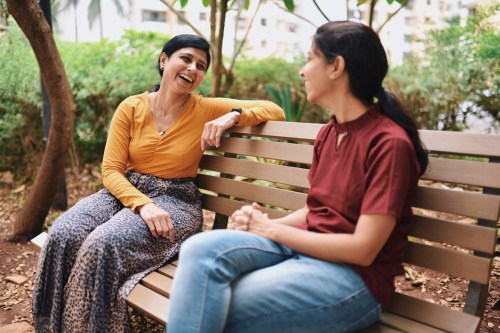How Simply Being Listened To Can Support Brain Health and Protect Against Cognitive Decline
Having someone you can count on to be a good listener may bring benefits to your cognitive health, according to new neurology research.

Right alongside the usual healthy-habit suspects of exercising and sleeping well, having a supportive social network delivers a whole slate of longevity-boosting perks. In fact, social relationships have been linked to everything from better cardiovascular and immune health by way of a lessened stress response to improved psychological well-being and even a reduced risk of dementia in older age. But according to new research, there may be a particular facet of social support closely tied to that last cognitive benefit: being a good listener.
Experts in This Article
neurologist and assistant professor of neurology at NYU Grossman School of Medicine
A recently published study of 2,171 participants found that those folks who reported having a reliable listener in their life also demonstrated greater cognitive resilience. In other words, people who have access to a good listener scored significantly higher on a variety of cognitive tests than neurologists would’ve expected based on their brain age.
As such, it’s possible that having a good listener in your circle can function as a buffer against cognitive decline and soak up some of the typical effects of brain aging, says neurologist Joel Salinas, MD, MBA, lead researcher on the study and assistant professor of neurology at New York University’s Grossman School of Medicine.
To measure cognitive resilience in the study, Dr. Salinas and his team examined two metrics in each person: brain volume (a signifier for a brain’s physical health, which decreases with age) and cognitive functioning based on a broad-sweeping neuropsychological evaluation, which Dr. Salinas describes as “a cross between a really hard SAT and a Mensa test, plus crossword puzzles all rolled into one several-hour test.” The intention was to get a full picture of each person’s ability to understand language, process visuals, and retain information—aka all the elements of what it means to think, says Dr. Salinas, which they termed “global cognition.”
In comparing that global cognition score with brain volume, then, they were able to figure out which participants scored above the expected number for their respective brain age and, therefore, had more cognitive resilience. From there, the researchers reviewed questionnaires answered by these participants about different aspects of their social support, including whether they had a good listener, received love and affection, were supported emotionally, and had frequent social interaction. And across the board, having a good listener turned out to be the element of support most often present for those with higher cognitive resilience.
“If I were to write a prescription based on the results, I’d say to create a scenario in which you can say ‘most’ or ‘all of the time,’ you have access to someone who’ll listen to you.” —Joel Salinas, MD
“The question we asked on the survey that correlated with listening was simply, ‘Can you count on someone to be available to listen to you when you need it?’” says Dr. Salinas. Participants could answer “none of the time,” “some of the time,” “most of the time,” or “all of the time.” “If I were to write a prescription based on the results, I’d say to create a scenario in which you can say ‘most’ or ‘all of the time,’ you have access to someone who’ll listen to you, since that’s where we saw the greatest effect,” he says.
It’s not that other types of social support don’t have a brain-health benefit, he caveats, but just that, in comparison, having a good listener readily available to you might be an extra-helpful preventative step against cognitive decline. And, in fact, the cognitive benefits of good listener availability start earlier than you might think.
“Although cognitive decline typically happens later in life, we actually found the most striking effect in people in the study under age 65, in their forties or fifties,” says Dr. Salinas, who advises surrounding yourself with good listeners—and being that good listener to the people around you—no matter what age you are. “The benefit is likely cumulative,” he says, “just as you might imagine starting an investment early in your life and adding to it through your eighties, versus starting in your late seventies; you’re going to have a lot more money in the first scenario.”
To build upon your cognitive resilience in the same way, then, it’s worth seeking out those people whom you feel are readily available to listen whenever you have something to say—and remembering to return the good-listening favor.
Oh hi! You look like someone who loves free workouts, discounts for cutting-edge wellness brands, and exclusive Well+Good content. Sign up for Well+, our online community of wellness insiders, and unlock your rewards instantly.
Sign Up for Our Daily Newsletter
Get all the latest in wellness, trends, food, fitness, beauty, and more delivered right to your inbox.
Got it, you've been added to our email list.










